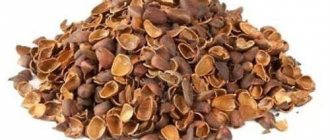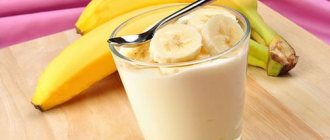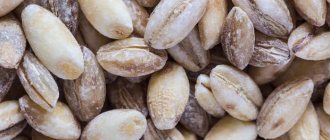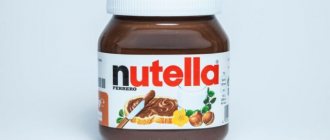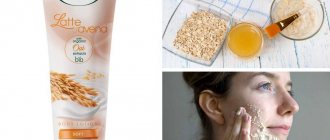Chemical composition
Like most milk-based products, sour cream has a rich composition. It contains many essential substances for humans:
- vitamins A, C, E, K, D;
- B vitamins;
- calcium;
- potassium;
- zinc;
- iron;
- amino acids.
The combination of a high content of vitamin D and calcium promotes their fastest absorption by the body. This means that the positive effect on bone tissue, nails, hair and skin will also be maximum.
How to take sour cream for medicinal purposes
People say that men must consume a small amount of sour cream. It will allow you to always be in shape and significantly improves sperm quality.
If you mix sour cream with carrots, you can significantly improve your vigilance and increase your immune strength. This simple method of consumption will also remove toxins from the body.
To speed up wound healing as much as possible, use sour cream for external use with high fat content. It is recommended to mix it with vegetable oil and egg white. And you won’t notice how the wound will heal!
A dessert made from sour cream with added sugar or honey will quickly improve your mood and cope with depression.
Calorie content
Sour cream is based on dairy cream, which has a high fat content. Therefore, the number of calories in sour cream itself is also quite high.
As a rule, you can find this product with fat content on store shelves:
- 10%: its calorie content is 115 kcal per 100 grams;
- 15%: 160 kcal per 100 grams;
- 20%: 200 kcal per 100 grams;
- 30%: 290 kcal per 100 grams.
This calorie content means that, despite all the positive properties, moderation should be observed when consuming sour cream so as not to encounter unwanted weight gain.
Is it possible to eat sour cream while losing weight?
There is a myth that it is easy to gain weight from sour cream, since it is a high-calorie product with a high fat content. This is not entirely true - if you consume sour cream in moderation, it will not only not harm your figure, but will also be good for your health.
Two tablespoons of sour cream (30 g) contain about 20 calories, which is not so much considering the daily intake of an adult (about 2000 calories).
So, how many calories are in 100 grams of sour cream?
- 10% fat - 115 calories.
- 15% fat—159 calories.
- 20% fat—203 calories.
- 30% fat - 290 calories.
Conclusion: when losing weight, you can and even need to eat sour cream, but you should give preference to low-fat varieties and observe moderation in quantity.
Beneficial features
Sour cream, like the milk from which it is produced, has a lot of healing properties for the human body:
- improving the functioning of the gastrointestinal tract;
- good functioning of the digestive system and increased appetite;
- assistance in cleansing the body of toxins and waste;
- normalization of hormonal levels;
- reducing the impact of stress on our well-being;
- increasing immunity;
- improving the condition of skin, nails and hair.
Calcium and magnesium are responsible for normalizing blood pressure and should be included in the diet of older people.
Calcium and phosphorus help maintain healthy teeth and nails and the entire musculoskeletal system.
Is it possible to gain weight from sour cream?
Can sour cream make you fat? Yes and no. The answer depends on the choice of product and the daily intake.
Daily norm. It is curious that nutritionists have calculated the annual intake of sour cream. It is 6.5 kilograms per person. Of course, this norm is conditional and can fluctuate depending on many factors. On average, an ordinary person can eat 25 grams of sour cream per day, that is, one full tablespoon. Overweight people should choose varieties with a fat content of no more than 20%.
The best time to take sour cream is morning or afternoon. In this case, the calories received from a portion of this delicious product will have time to be completely consumed during the day. Accordingly, it is better not to use sour cream at night.
Combination with products. In addition to the familiar and truly healthy cottage cheese with sour cream, it is best to combine fermented milk products with vegetables and fruits.
Carrots, tomatoes, cucumbers, lettuce, sorrel, spinach, herbs and green onions are all great partners for sour cream on your menu. In this case, fat-soluble vitamins contained in many vegetables will be absorbed in the best possible way, and the fat content of sour cream will be diluted with fiber, which will only benefit the body.
The same applies to a popular drink made from sour cream and tomato juice, especially among men. Flavored with a pinch of spices, the drink, in addition to its general medical benefits, also has a positive effect on “men’s health.”
Sour cream on an empty stomach with flax seeds (ground into flour). This common recipe for weight loss is worth mentioning separately.
The method really helps to improve the functioning of the gastrointestinal tract and to some extent lose weight, but it has a lot of contraindications.
In particular, due to the strong choleretic effect of flaxseed, the movement of stones and sand may occur, the presence of which people often do not know for the time being. In such cases, taking flaxseed flour risks ending up in calling emergency doctors.
sour cream in its pure form . The only exceptions are special medical nutrition for people suffering from diabetes, and a sour cream diet for weight loss, which has recently been gaining popularity.
Benefits for women
Women have long appreciated the beneficial effects that sour cream can give to their health.
For example, during pregnancy, due to the content of B vitamins, this fermented milk product helps the fetus to form correctly and reduces the risk of miscarriage.
Sour cream will also be useful if a woman is taking birth control pills. After all, it contains choline, which improves mood and reduces the risk of depression.
Sour cream can improve the digestion process and relieve constipation, which is why women love to include it in their diet.
This product is also often used as a component of home beauty products - creams, face and body masks, because it strengthens hair and improves skin condition.
Is it possible during pregnancy and breastfeeding?
During pregnancy and breastfeeding, sour cream will provide the woman with the necessary support. It will make up for the lack of essential vitamins, give strength, and also replace those sauces that may be prohibited during this delicate period due to their not very natural composition.
Attention: the generally accepted amount of sour cream for an adult, including breastfeeding, is about 20 grams per day, that is, two tablespoons. Try to follow it so that your child does not develop an allergy to lactose.
Dairy and fermented milk products for losing weight
Dairy products are one of the main components of any diet. But professional nutritionists do not advise abusing them.
Their main value is that they contain both quickly digestible and long-digesting proteins and large amounts of calcium. These components are necessary for the body for the normal course of metabolic processes, the construction of new tissues, and their restoration from damage. In addition, a sufficient intake of protein into the body during a diet will protect muscles from destruction due to a lack of calories in the diet.
But everything needs moderation. If you constantly consume dairy products in large quantities, then there is a chance of gaining excess weight and developing problems with the gallbladder. If you regularly drink kefir or yogurt before bed, you can improve your intestinal microflora and normalize the process of food digestion by populating your intestines with beneficial microorganisms.
Expert opinion
Evgeniy Kislitsa
Practicing surgeon. Certified massage master. Two-time vice-champion and heavyweight champion of regional kettlebell lifting competitions.
There is no such thing as a lactose allergy. There is a concept of lactose intolerance. And the mechanism of its development has nothing in common with the mechanism of development of allergic reactions (true allergies). Lactose intolerance is not an allergy, but a feature of the intestines. This phenomenon occurs when a person has a deficiency of the enzyme lactase. The absence of this enzyme leads to impaired digestion of milk sugar (which is what lactose is), which increases fermentation in the intestines. The mechanism of allergy development does not involve enzymes of the digestive system. It is much more complex and is caused by a pathological reaction of the immune system to the penetration of a certain foreign agent into the human body. However, upon first contact with this agent, an allergic reaction does not develop. At this time, the immune system is sensitized to a foreign agent that has entered the body. In simple terms, the immune system studies such an agent and develops a specific, but erroneous response tactic to its re-entry into the body. And now, in the case of all subsequent ingress of this foreign agent into the body, its pathological reaction develops according to a plan already developed by the immune system. That is, a true allergy develops. Therefore, do not confuse enzymatic deficiency and gastrointestinal allergy (allergy to a food product). These are completely different pathological conditions, although their clinical manifestations may be similar.
Kefir contains many beneficial bacteria that regulate the gastrointestinal tract and prevent bloating, indigestion and other problems with the stomach and intestines. Due to the natural protein casein, milk and its other components allow you to gain muscle mass during a diet for its growth and prevent the loss of muscle mass when following a diet aimed at losing weight, but they have no effect on burning fat.
Important! Kefir and lactic acid products contain beneficial bacteria that not only normalize digestion, but also prevent the development of a number of gastrointestinal diseases. This is due to the phenomenon of competition between microorganisms. It boils down to the fact that the type of microbes, the representatives of which are more numerous in a certain area of the intestine, suppresses the population of all other microorganisms in this section of the intestine. Thus, with a high population of beneficial bacteria in the intestines, the population of pathogenic microbes is reduced, and therefore the risk of developing diseases of the digestive tract caused by pathogens is reduced. Also, some bacteria living in the intestines are capable of producing enzymes and even vitamins that are useful for humans during their life. They not only improve digestion, but also strengthen the immune system. And vitamins are necessary for the normal course of a number of metabolic reactions. This type of relationship between the host organism (human) and the organisms living in the host's body is called beneficial symbiosis. Both the host and the microbes benefit from it.
The nutritional value
The nutritional value of a dairy product is assessed in the amount of proteins, fats, carbohydrates and other nutrients. During the production of milk and other dairy products, their structure changes. It is saturated with beneficial microorganisms, the introduced starters improve the digestibility of milk protein. Thanks to starter cultures, the original dairy product receives completely new properties, and the resulting product is a completely different product. And the calorie content of foods is increasing. Only they can simultaneously contain more than 100 useful microelements. Each dairy product contains at least 5 amino acids, 10 fatty acids, as well as 8 vitamins and minerals.
If we consider only milk, then its nutritional value is as follows:
- Water – 80%.
- Fats – 7%.
- Proteins – 5%.
- Lactose – 6%.
1 liter of milk is about 2500 kJ. This energy value is about 25% of the required energy norm for an adult. Also, 1 liter of milk contains 0.5 mg of vitamins A, B, C, E, etc. Kefir, cream and sour cream also contain vitamins E and D. Cheese products contain the entire spectrum of B vitamins.
Expert opinion
Evgeniy Kislitsa
Practicing surgeon. Certified massage master. Two-time vice-champion and heavyweight champion of regional kettlebell lifting competitions.
B vitamins have the widest range of effects on the human body. They ensure the transmission of nerve impulses from cell to cell and have a positive effect on brain function. Also, B vitamins are necessary for normal hematopoiesis and fully meeting the oxygen and vision needs of body tissues. In addition, B-group vitamins affect the processes of nutrient metabolism, the synthesis of a number of biological compounds, enzymes, and the processes of energy release during digestion. Plus, vitamin B5 is necessary for a full immune response, wound healing, and nervous system function. Vitamin B6 is needed for the normal functioning of the cardiovascular system. It also affects immune function. Vitamin B7 plays an important role in metabolic processes and regulation of blood glucose levels. And vitamin B9 (folic acid) ensures normal cell growth and division, and therefore the formation of new tissue, which is especially important for pregnant women. After all, folic acid plays a huge role in the formation of the fetus and its growth. Vitamin B9 also prevents the appearance of malignant tumors. And without vitamin B12, the formation of nucleic acids, the absorption of amino acids, the processes of hematopoiesis, and the biosynthesis of the protective sheath of nerve fibers cannot occur. Thanks to it, the blood coagulation system is stimulated and cholesterol levels are reduced.
Dairy substances stand out from other products because they contain calcium and phosphorus. But the whole peculiarity is that in all other products calcium prevails in quantity over phosphorus. And for a favorable and rapid metabolism, phosphorus and calcium should be in a 2:3 ratio.
Important! Fermented milk products with a minimal proportion of fat in their composition, but artificially enriched with vitamins and minerals, will be the best choice for older people, as well as those who are overweight.
Benefits and harms
Benefit:
- Dairy products contain potassium. Scientists have proven that a sufficient amount of potassium in the body lowers blood pressure levels. In addition, potassium helps lower the heart rate and reduce the load on the heart muscle, which helps fight tachycardia and other heart diseases.
- The content of vitamin D, as well as phosphorus and calcium, contributes to the normal formation of bone tissue in childhood and its sufficient strengthening in older people. Plus, it is these substances that ensure the restoration of bones and cartilage (to a lesser extent) after damage.
- Cottage cheese is necessary for pregnant and lactating women, since the minerals and vitamins it contains (especially folic acid and calcium, iron) are necessary for the formation of the fetus, the formation of organs and systems, and their subsequent normal development and growth. After all, it is from the mother that the fetus and child in infancy receive all nutrients, and the mother receives them from food.
Harm:
- Presence of harmful chemicals and preservatives in products. To increase shelf life and give dairy products a more pleasant taste, preservatives and flavor enhancers are added to them. Because of this, a certain percentage of consumers may be allergic to unnatural additives. And particularly unscrupulous manufacturers add antibiotics to their products to increase the shelf life, which has very dangerous consequences for the individual consumer and all of humanity as a whole. Real dairy product will not last longer than a week.
- The high lactose content in dairy products can cause blood sugar levels to rise to dangerous levels in people with diabetes. This is why dairy products should not be consumed constantly and in large quantities by those who suffer from diabetes. The intake of milk and its derivatives should be limited.
- High insulin index. Its increased content in cottage cheese leads to the fact that the body begins to store calories for difficult times. And if the content is close to critical, then the fat burning process can slow down by almost 2 times.
- Significant glycemic index. The high calorie content of some dairy products, such as cottage cheese, not only satisfies hunger and provides the necessary energy, but can also cause the body to start storing calories for difficult times. And these reserves are nothing more than fat deposits. Those who suffer from diabetes should be especially careful with foods that have a high glycemic index. Excessive consumption of such foods will lead to an abnormal increase in blood glucose levels, and this is dangerous to health. In addition, if the body of even a completely healthy person begins to receive calories in excess, it will begin to actively form fat reserves.
Attention! Adding antibiotics to food leads to an increase in resistance to them in microorganisms that are dangerous to health - the microbe becomes insensitive to the antibiotic. And this leads not only to an increase in the population of such bacteria, but also to the fact that treatment for the diseases caused by them becomes ineffective. Today there are already types of bacteria that are practically insensitive to drugs generally accepted for the treatment of diseases caused by such microorganisms.
Are they suitable during diets?
Dairy products can be consumed during weight loss, but in certain quantities. Due to the high protein and calcium content in these products, the body will receive the substances necessary for muscle growth and will be able to maintain the stability of metabolic processes, it will be easier to tolerate physical activity. But milk is a “storehouse” of fats. Eating sour cream and cream is also not recommended for a similar reason. Namely, fats from dairy products are quickly deposited in fat reserves, and getting rid of them is problematic.
Important! Ryazhenka and kefir can be used as diuretics when losing weight. They will help remove water from the body, thereby reducing the number on the scale. However, it is worth remembering that the desired reduction in numbers on the scales is achieved not by burning fat, but by removing water, that is, this is not weight loss, but getting rid of fluid, which can result in a loss of 1, maximum 2 kilograms, which will return when returning to normal drinking regime. Also, due to the easily digestible protein, milk helps to quickly satisfy hunger, which allows you to quickly get enough and not overeat. But you shouldn’t eat sour cream and cream; their nutritional value is too high for dietary nutrition.
Be sure to check out:
Is it possible to eat corn while on a diet: benefits and harms? Get a complete set of proteins, fats and carbohydrates from Doshirak dietary products on a diet: is it possible to eat fast food products? Is it possible to eat soy sauce while on a diet: all the myths and truth
Benefits for men
Men can benefit from sour cream because it contains a lot of protein. This component can increase potency and libido, as well as increase testosterone levels.
Protein helps rapid muscle growth, which means this fermented milk cream will come in handy for those men who actively play sports and take care of their shape.
In general, regular consumption of sour cream has a positive effect on the male body:
- promotes blood flow to the groin area;
- protects the body from viruses and infections;
- increases the production of male hormones;
- improves hemoglobin levels.
Attention! Despite all these positive properties, I advise against eating fermented milk in too large quantities, as this can lead to undesirable results: weight gain and digestive problems.
Sour cream diet
The essence of the diet is that you need to eat 400 grams of sour cream per day, dividing this amount into 5 doses. This achieves five meals a day, the so-called fractional meals, the benefits and effectiveness of which no one doubts. In addition, it is recommended to drink 2 glasses of rosehip decoction on the day of the diet and limit it to that.
Of course, sour cream is consumed in its pure form, without jams, fruits and sugar, and the rosehip decoction should also not be sweet. Sometimes it is recommended to use a product with 30% fat content, but for weight loss purposes it is more logical to limit the fat content to 10-15%, maximum 20%.
Duration. The sour cream diet is a mono-diet, and, like any other mono-diet, should not last more than three days.
At what age can it be given to children?
Sour cream is made from milk, so it should not be given to children under one year of age. This is explained by the fact that their body is not yet ready to digest this product. To avoid colic, bloating or diarrhea, it is better to abstain from it.
Important! Milk and dairy products can adversely affect the gastrointestinal tract of a small child and harm the liver and pancreas. Consult your pediatrician before introducing them into your baby's diet.
If the child tolerates this product well and does not have allergies, then you can safely add sour cream to children's dishes 2-3 times a week.
What are they trying to replace sour cream with in stores?
Alas, city residents often have to be content with sour cream obtained through separation. Real sour cream is very difficult to find, except in a remote village.
But under any circumstances, the manufacturing technology of this product does not imply the addition of chemical ingredients, fat substitutes, dyes and flavor enhancers. In fact, in stores you can usually only buy a surrogate, which does not provide any benefit to the body. Usually such products are called sour cream mixtures and products. These products contain emulsifiers, vegetable fats and stabilizers. This “sour cream” is inexpensive, but is not needed by the human body.
Application in home cosmetology
The benefits of sour cream when consumed internally are undeniable, but it can bring no less benefit when used in home cosmetology. Traditional medicine advises adding it to various face masks. This is explained by the fact that the fermented milk product is capable of:
- rejuvenate the upper layers of the epidermis;
- normalize blood circulation;
- restore skin after negative environmental influences.
Anti-wrinkle mask
In order to get an effective homemade mask with a rejuvenating effect, just take:
- 30 ml of village sour cream of maximum fat content;
- 10 g blue clay powder;
- 2 drops vitamin E.
Pour the clay into the sour cream and stir until a homogeneous consistency is obtained. Then add the oil and gently apply the mixture to your skin. Leave on until the mask dries. Rinse with warm water, remove any remaining mask residue with a cotton pad soaked in natural toner, and apply your usual cream.
After the first use, you will see that the skin has become softer, a blush has appeared, and wrinkles are less noticeable. This mask can be made every day.
How to produce
Any housewife is sure: a product prepared at home is better and healthier than a store-bought one. Even a beginner can do it. To do this, it is enough to have 2 main ingredients at your disposal: cream (or milk) and sourdough.
Homemade sour cream, the benefits and harms of which will depend entirely on the quality of the raw materials and the method of preparation, can have different fat content. It is almost impossible to measure it at home. However, the thicker the consistency, the higher the percentage of fat there. It can definitely be said that cream produces a product with a higher indicator than milk.
Cooking method at home
You can use kefir or ready-made sour cream as a starter. Bring half a liter of cream to a temperature of 40 degrees, pour in the selected fermented milk product and leave for 12 hours. To keep warm, wrap the container with a blanket or place it near the radiator.
The thickened mass must be filtered through cheesecloth. The resulting liquid is not further used in production, but can be used for baking. Beat the gauze mixture with a blender. If the consistency seems too thick, dilute the contents with milk. Now all that’s left is to let it brew in the refrigerator for 6 – 7 hours, and the sour cream is ready.
Preparation in production
The first stage is the acceptance of raw materials. This can include cream, whole or skim milk and butter. They are cleaned of foreign impurities and left in tanks where they await their turn.
Next comes normalization. If the cream is not fat enough, butter is added to it. If, on the contrary, the indicator is high, the product is diluted with skim milk.
Homogenization is a complex process whose purpose is to separate large fat globules into smaller components. This increases the viscosity and improves the consistency of sour cream.
Fermentation - at this stage the main ingredient is added, the light of which produces the fermented milk taste. Cream (temperature 20-26 degrees Celsius) and a special starter are poured into a huge container (volume can reach 6000 liters). Its mass fraction can vary from 1% to 2.5%. Mixers installed in the container start the process of combining all the ingredients. The starter should be evenly distributed throughout the entire volume.
The penultimate stage before packaging is ripening. A long procedure, taking from 6 to 16 hours. Readiness is determined by acidity. This indicator is measured in Turner degrees. It will be different for each type: dietary – 68-75 oT, classic – 55 – 70 oT, low-fat – 55 – 75 oT.
Packaging is carried out in small packages. The temperature is left unchanged or cooled slightly. This allows the product to ripen while already packaged in containers without access to air.
As is clear from the analysis of the main stages of production, the finished product can differ significantly in the percentage of fat. This also affects the consistency and calorie content of sour cream.
Types by fat content
- High fat – up to 58%. The percentage of proteins and carbohydrates is not very different from a low-fat product. It is a record holder for calorie content - it can reach 420 - 460 Kcal. It can very rarely be found on shelves, as it is not particularly popular.
- Oily – up to 48%. Has antidepressant properties. To do this, it is mixed with sugar and consumed daily. Calorie content ranges from 380 to 400 Kcal.
- Classic – up to 34%. This category is most in demand among consumers. Nutritional value up to 348 Kcal per 100 g of product.
- Low fat – up to 19%. Used to prepare light sauces and salad dressings. The calorie content is already significantly lower than in previous samples - 158 - 206 Kcal. Dietary – up to 14%. To obtain this indicator, it is diluted with skim milk. At the same time, it does not lose its beneficial properties. Can be consumed even if you have problems with excess weight or active weight loss (up to 140 Kcal per 100 g).
Harm and contraindications
Unfortunately, sour cream, like other dairy products, has contraindications. It is better to avoid it for those who are diagnosed with:
- gastritis;
- ulcer;
- diseases of the gallbladder and liver.
Even if you do not suffer from any of these diseases, it is believed that it is better not to consume sour cream at night, as it can negatively affect the digestion process, lead to heaviness in the stomach and problems with sleep.
You can also learn about the characteristics of sour cream from the following video.
Milk and sour milk at night: is it worth consuming?
Of all the dairy products, you can consume only a few at night. This is cottage cheese and fermented baked milk. Ryazhenka promotes intestinal function and normalizes its microflora. Cottage cheese will serve as a reliable source of energy, nutrients and minerals necessary to restore the body after a working day. And the large amount of protein in cottage cheese helps restore muscle tissue after strength and cardio training. Roughly speaking, the protein in cottage cheese is similar to sports protein, but is absorbed much faster.
How to choose and store correctly
In order not to make a mistake and choose the right sour cream in the store, just follow these simple tips:
- Read the ingredients carefully: a natural product contains only sourdough and cream.
- Natural fermented milk cream cannot be called a “sour cream product”: this only indicates that you are buying a product with a large number of additives. And these supplements are not always useful!
- High-quality sour cream should have a white color with a creamy tint.
- Good sour cream cannot have a long shelf life. The maximum for a quality product is 10-14 days.
If you do not want to buy a ready-made product, then on our website you can find a detailed recipe for making homemade sour cream with your own hands.
Sour cream is always stored in the refrigerator. Once you have opened the package, try to use it within 3-4 days. Otherwise, it will spoil and you risk getting poisoned.
To whom and in what cases can sour cream be harmful?
- People who have diseases of the digestive system (ulcers, gastritis with high acidity). In this case, you should consult a specialist.
- Eating a lot of sour cream is not recommended for those who are watching their figure and on a diet. In this case, it is better to buy sour cream with a low fat content.
- People who have problems with the liver and gall bladder should consume sour cream with caution. In this case, it is better to eat sour cream in the first half of the day.
- If you have problems with the cardiovascular system, you should pay attention to the cholesterol content in sour cream.
- You should not eat sour cream if the expiration date has passed, or if the storage conditions specified on the packaging have been violated.
A famous brand with a rich history of quality lasting more than half a century
Sour cream for beautiful hair
The benefits of sour cream for hair are as follows:
- strengthens the bulbs;
- eliminates oiliness, dandruff, seborrhea;
- adds volume;
- gives shine;
- protects against dryness.
The effect of masks with sour cream is noticeable after the first use.
Sour cream mask for dry hair
To prepare you will need:
- egg – 1 pc.;
- honey – 50 g;
- sour cream – 60 g;
- castor oil – 50 ml.
Application:
- beat all ingredients with a whisk;
- apply the resulting mask over the entire length of the hair;
- the head is wrapped in a towel or a special cap is put on;
Keep the mask for about 1 hour, and then wash your hair with shampoo.
Sour cream and egg for hair
Quail eggs are most suitable for this mask.
Ingredients:
- chilled eggs – 3 pcs.;
- sour cream – 70 g.
Application:
- the proteins are not needed for the mask, so they are separated;
- 3 yolks are mixed with sour cream, whipping into foam;
- apply to hair, massaging the roots well;
- the head is covered with film and wrapped in a towel;
- The mixture is kept for about 1 hour and then washed off.
First of all, sour cream with eggs is useful for strengthening hair roots and improving their structure.
Lightening hair with sour cream
The mask will lighten your hair several tones.
Ingredients:
- chopped ginger 20 g;
- lemon zest;
- sour cream 80 g;
- water 0.5 l.
Application:
- ginger and lemon zest are poured with boiling water and left for about 4 hours;
- add the remaining components to the strained tincture (100 g);
- the product is applied along the entire length of the hair;
- wrap the head with film and then with a towel for 2 hours.
Wash off the mask with chamomile decoction.
Homemade sour cream recipe
To prepare you will need:
- curdled milk – 200 g;
- cream – 400 g.
Preparation:
- yogurt is poured into a deep glass container;
- add cream and mix until smooth;
- cover and leave in a warm place for 40 hours;
- after some time you need to mix the thicker layer with the liquid one;
- Afterwards the mixture is placed in the refrigerator for 24 hours.
Healthy homemade sour cream is ready for use.

